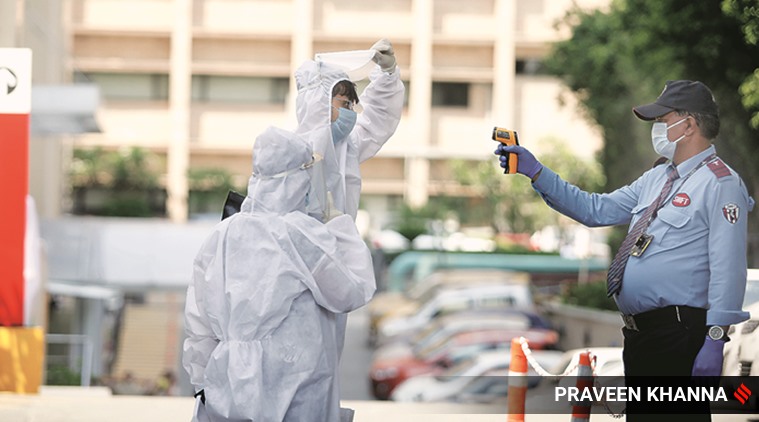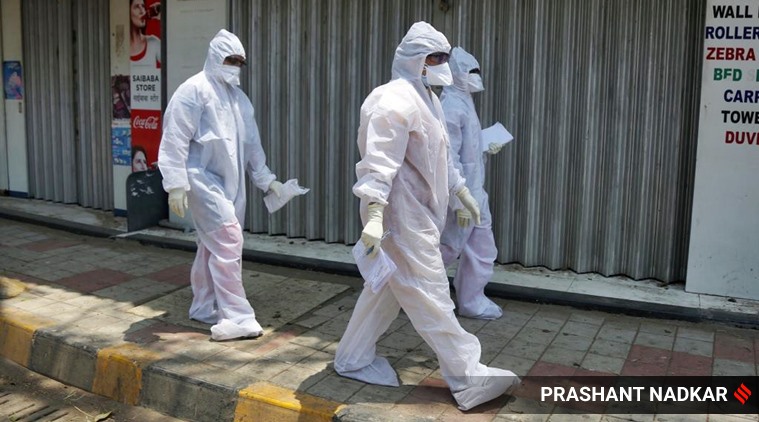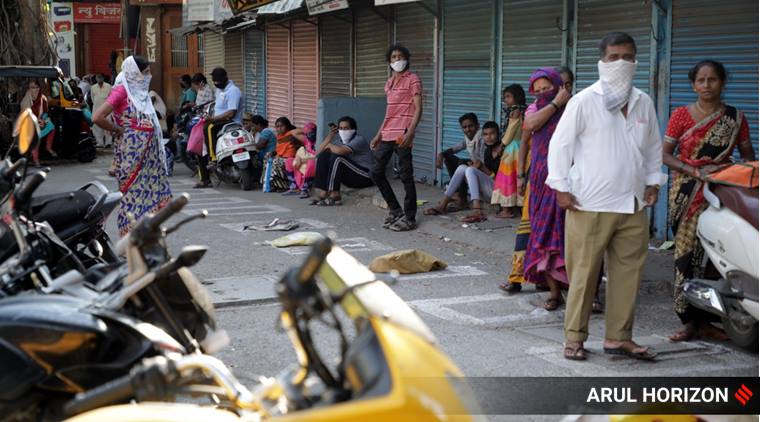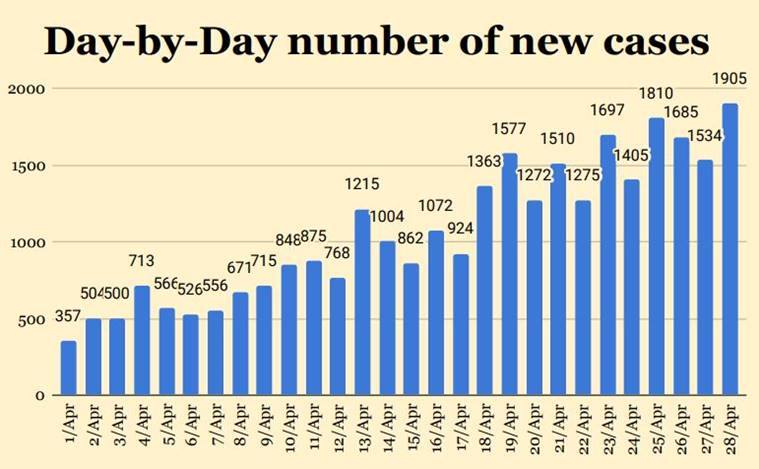 Screening at Safdarjung hospital, New Delhi.
Screening at Safdarjung hospital, New Delhi.
Coronavirus India Updates: In the last 24 hours, the country has recorded 73 deaths, the sharpest single-day increase so far, taking the toll to 1,007. The total number of confirmed Covid-19 cases crossed the 30,000-mark to reach 31,332 as state prepare to gradually ease restrictions after the nationwide lockdown ends on May 3. The recovery rate is now at 23.3 per cent with 7,695 people recovered and discharged.
The Health Ministry, meanwhile, said that, of the active cases in hospitals or quarantine facilities till Sunday, only about 80 of them were on ventilators. According to Health Ministry data, 2.17 per cent were admitted in the Intensive Care Unit (ICU), 1.29 per cent required oxygen support, and 0.36 per cent were on ventilators.
Maharashtra is the worst-affected state with at least 400 deaths and over 9,318 cases including 1,388 recoveries so far, followed by Gujarat with 3774 cases and 226 deaths. Delhi recorded 206 new cases on Wednesday, taking the tally to 3314 positive cases and 54 deaths. So far, Arunachal Pradesh, Goa, Manipur and Tripura have been declared Covid free. Mizoram (1), Puduchery (8) and Meghalaya (12) have the least number of cases.
Here are key updates over coronavirus across the country:
AIIMS planning to conduct clinical trial of plasma therapy
 The recovery rate is now at 23.3 per cent with 7,695 people recovered and discharged.
The recovery rate is now at 23.3 per cent with 7,695 people recovered and discharged.
The All India Institute Of Medical Sciences is planning to conduct a clinical trial of the convalescent plasma therapy in the treatment of COVID-19 and modalities of taking approvals from the Drug Controller General of India are being worked out. AIIMS Director Dr Randeep Guleria said the mode of treatment in COVID-19 is still at an “experimental stage” and there is a need for good and well conducted research trials before its benefit and this mode of therapy can be recommended for routine use in coronavirus patients.
“AIIMS is working with the ICMR to conduct a clinical trial on the efficacy of convalescent plasma therapy in COVID-19 patients,” he said. The doctor said it is necessary for all institutes to take necessary approvals from the Indian Council of Medical Research (ICMR) and the Drug Controller General of India and follow proper clinical practice guidelines for this research. “In very limited studies, globally, convalescent plasma as an adjunct to other supportive therapies and treatments has shown some benefit in the management of severe patients of COVID-19,” Guleria said.
CBSE set for Board exams after lockdown ends
The Central Board of Secondary Education (CBSE) is prepared to hold the remaining board exams approximately 10 days after the day the nationwide lockdown ends, state education ministers were told in a meeting with the HRD minister on Tuesday, even as some of them suggested that Class 10 and 12 students be promoted based on internal assessment.
The minister also asked state governments to start evaluating their board exam answer scripts and assist the CBSE in doing the same. According to ministry sources, the Centre-run school board is planning to deliver the answer sheets to examiners at home and, hence, needs the state administration’s cooperation.
Gene sequencing doesn’t suggest ‘Indian’ COVID-19 strain so far
The ongoing analysis of the gene sequences of the novel coronavirus has so far not revealed anything to suggest that the virus present in India is in any way different from that circulating in other parts of the world. There is also no evidence, as of now, of any one particular strain of the virus being more deadly than the other, scientists have said.
Gautam Menon, a professor of computational biology and theoretical physics at the Institute of Mathematical Sciences in Chennai, said even in other parts of the world, there was no “unambiguous” evidence to suggest that any one strain of the virus was more “virulent” than the other.
Infant among 73 new COVID-19 cases in AP
An 11-month-old baby was among the 73 people who tested positive for coronavirus in Andhra Pradesh in the last 24 hours ending 9 am on Wednesday. The state's Covid-19 tally now crossed the 1300 mark and touched 1,332, the latest government bulletin said.
Viruses, or indeed any organism, develop minor but permanent changes in their genetic codes, called mutations, over a period of time due to a variety of factors, including climatic and environmental conditions. It is these variations that are responsible for the diversity that is seen in any organism.
Hotspot districts shrunk to 129 from the 177
 People are waiting at a ration shop in Kothrud during lockdown owing to the pandemic COVID-19 outbreak.. Express photos by Arul Horizon. 28/04/2020, Pune
People are waiting at a ration shop in Kothrud during lockdown owing to the pandemic COVID-19 outbreak.. Express photos by Arul Horizon. 28/04/2020, Pune
Nearly after three weeks of implementing the curbs, the number of hotspot districts (red zones) has shrunk to 129 from the 177 — India has 736 districts — that were identified on April 15. The number of orange zone districts has risen from 207 on April 15 to 250 now, sources in the Health Ministry said. Twenty of the red-zone districts account for 60 per cent of the novel coronavirus case load in the country, data available with the Ministry show.
This data is crucial as the government explores modalities for relaxations after May 3. Over the past few weeks, the disease has spread to more districts, but it is in the major urban centres of Delhi, Mumbai, Pune, Indore, and Ahmedabad that the clusters of larger and faster transmission have emerged.
Maharashtra and Gujarat account for 60% of all Covid-19 deaths in India
 Tuesday marked another peak in the daily increase of Coronavirus cases, with 1905 new infections being discovered.
Tuesday marked another peak in the daily increase of Coronavirus cases, with 1905 new infections being discovered.
Maharashtra and Gujarat together reported over 50 Coronavirus-related deaths on Tuesday, as the total number of dead in the country reached close to 1000. The two states alone account for almost 60 per cent all deaths in the country.
Ahmedabad once again reported 19 deaths on a single day, taking the city’s death count to 129. Two days earlier too, it had reported 19 deaths. Twenty-five of the 31 deaths in Maharashtra came from Mumbai. Some of them had died a few days earlier but their tests were confirmed only on Tuesday. Together Maharashtra and Gujarat now have seen the death of at least 583 people.